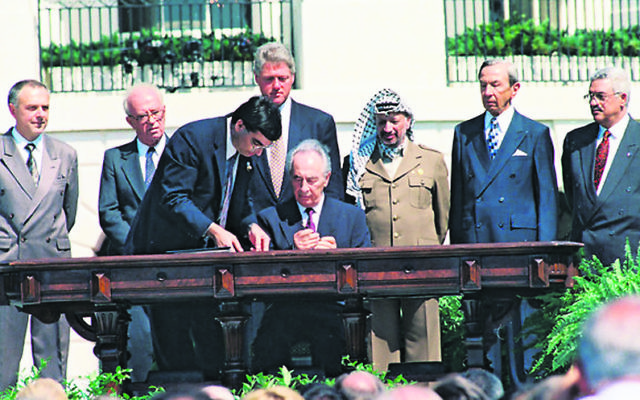Accords architect: Oslo is not dead
While many see the Oslo Accords as misguided and a failure, the man behind them says he still believes in them, reports Nathan Jeffay.
DESPITE everything Yair Hirschfeld, architect of the Oslo Accords, is still hopeful that the process will yield peace — and says that those who doubt it “don’t understand reality”.
In a wide-ranging interview, The AJN asked Hirschfeld how he feels on the 25th anniversary of the accords. He said, “The key answer is a sense of hope,” arguing that the current impasse is a bump in the road, not a dead end.
“I’m an historian, and conflict between people over land is not something solved in one day. People who say it is don’t understand reality.”
Many in Israel see it very differently. A Knesset caucus headed by government and opposition politicians recently held a conference called: “Oslo Failed, Victory Now.” They claimed on invitations, “It is clear that 25 years later not only are we further from peace, but the Oslo paradigm has clearly failed to end the conflict.”
But as Hirschfeld sees it, when he and a friend, Ron Pundak, started secretly talking to Palestinians in the the late eighties, and then began holding clandestine meetings, reality changed long-term.
One meeting in particular that Hirschfeld, then voluntary advisor to Deputy Foreign Minister Yossi Belin, went to is seen as a breakthrough moment. In 1992 he went to see Ahmed Qurei, also known as Abu Ala, confidante of Yasser Arafat, in London. There, he started to see the potential of the discussions. They shared details with Beilin, but it would be months before Yitzhak Rabin and Shimon Peres were let in on the secret.
Hirschfeld has a sense currently that the Palestinians are “running away from reality” and failing got move towards an agreement with Israel, while Israel’s leadership is also stalling. He calls this an “unholy alliance” of two sides saying: “We’re in a conflict zone, let’s hate each other.”
Israel is currently marking the 40th anniversary of the Camp David Accords, which led to Israeli-Egyptian peace, as well as marking 25 years since the Oslo Accords. Hirschfeld stresses the connections between them, and says that it was actually the Israeli-Egyptian accords that prompted him to talk to the Palestinians.
The Camp David Accords, signed by Egyptian and Israeli leaders Anwar Sadat and Menachem Begin respectively, didn’t only address their bilateral relations. They committed the two countries to a hold negotiations together with the Palestinians on the future of Gaza and the West Bank. The accords stated that in the West Bank and Gaza “the Israeli military government and its civilian administration will be withdrawn as soon as a self-governing authority has been freely elected by the inhabitants of these areas.”
Hirschfeld said: “I started my work on these issues in 1979 and 1980, trying to fulfil Camp David. I suggested bottom-up self government with economic empowerment of Palestinians in the West Bank and Gaza.” He was trying to “achieve the letter and spirit of Camp David.”
Today, he said, “people talk about Camp David but have never read it,” leading them to forget the importance it places on the Palestinian issue.
He thinks that Israel made “strategic mistake” in not establishing Palestinian autonomy in fulfilment of Camp David, and thinks there have been various bad decisions since Oslo, but sees all of this in the context of highs and lows for the cause of peace. “We moved forward at Oslo and this is the downturn, but it prepares for an upturn later,” he said.
NATHAN JEFFAY


comments